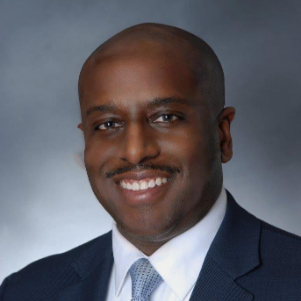Carlos Williams, M.D., M.P.H., M.B.A.

Fellowship Profile
Biography
Captain Carlos D. Williams is a native of Albany, Georgia and an active duty naval officer currently serving as the Director of the National Intrepid Center of Excellence at Walter Reed National Medical Center in Bethesda, Maryland. Williams is the past Director of the Office of Global Health Engagement for the Department of the Navy, where he served as the primary advisor on global health matters. During his tenure, he designed and implemented the Navy’s Global Health Specialist Program and is the architect of the Integrated Trauma and Medical Readiness Exchange to support readiness of the operational forces and build partner-nation capacity.
Williams served as the U.S. Health Affairs Attaché to the Pacific Islands, where he was the principal health advisor to the U.S. Ambassadors of the Pacific Island Countries and Territories (PICT) and the Regional Advisor to the U.S. Pacific Command for global health. In this role, he coordinated the Regional U.S. Health Team, serving the U.S. Missions in Port Moresby, Papua New Guinea (PNG), Suva, Fiji, and Oceania at-large. As the PEPFAR point of contact for PNG, he led his team to a significant resource and personnel increase and was pivotal in gaining increased funding from the Global Fund to combat the drug-resistant tuberculosis, which was deemed a national emergency. Working with allied partners and regional and international organizations, he led the Team in gaining U.S. government assistance for public health emergencies and non-communicable diseases as the greatest threats to the PICT.
Prior appointments include the U.S. Navy Surgeon General’s Special Advisor for Humanitarian Assistance and Disaster Response and liaison to the Uniformed Services University of the Health Sciences (USUHS). During this time, Williams also served as chair of the Office of the Assistant Secretary of Defense for Health Affairs Medical Stability Operations Working Group/Education and Training Committee.
Among his numerous military assignments and accomplishments, Williams deployed to Iraq in support of OPERATION IRAQI FREEDOM, where he served as head of pediatrics; his unit was awarded the Navy and Marine Corps Presidential Unit Citation. He went on to serve as deputy director of the Navy Enteric Diseases Program and was the principle investigator for several first-in-human enteric vaccine trials.
Williams served as the principal agent for the hallmark U.S. Agency for International Development and U.S. Africa Command-funded Pandemic Response Program (PRP). The program focused on crisis response to public health emergencies and was where Williams first designed and implemented his Unified Strategic Implementation and Planning Process. This process mobilized stakeholders and sectors across the community to ensure inclusiveness while working in coordination with other U.S. government departments, numerous United Nations agencies, and international and national non-governmental organizations to improve partner nations’ disaster-response capability. As a direct result, over 14 nations developed their own pandemic-response plans.
Williams graduated with honors from Albany State University with a Bachelor of Science in biology and a minor in chemistry. He earned his Doctor of Medicine from Morehouse School of Medicine and completed his internship and residencies in Internal Medicine and Pediatrics at Wayne State University. He earned his Master of Public Health in international health and HA/DR and Master of Business Administration in health leadership and management from Johns Hopkins University. Williams also holds an International Diploma in Humanitarian Assistance (IDHA) from Fordham University and has completed a faculty development program in health disparities and medical education.
Williams has received numerous awards, including the National Medical Association’s 2011 Presidential Citation for his work in Africa, and in 2015, he was selected as an inaugural U.S. Presidential Leadership Scholar focusing on social change and community development. Williams was also a 2018-2019 National Academy of Medicine and Robert Wood Johnson Foundation Health Policy Fellow with the U.S. Senate. Beyond his clinical specialty, Williams’ career has focused on implementation science, community organization, and building consensus to ensure inclusion in and ownership of the process of change. He is nationally certified in wildernesses Search and Rescue with K9s.
